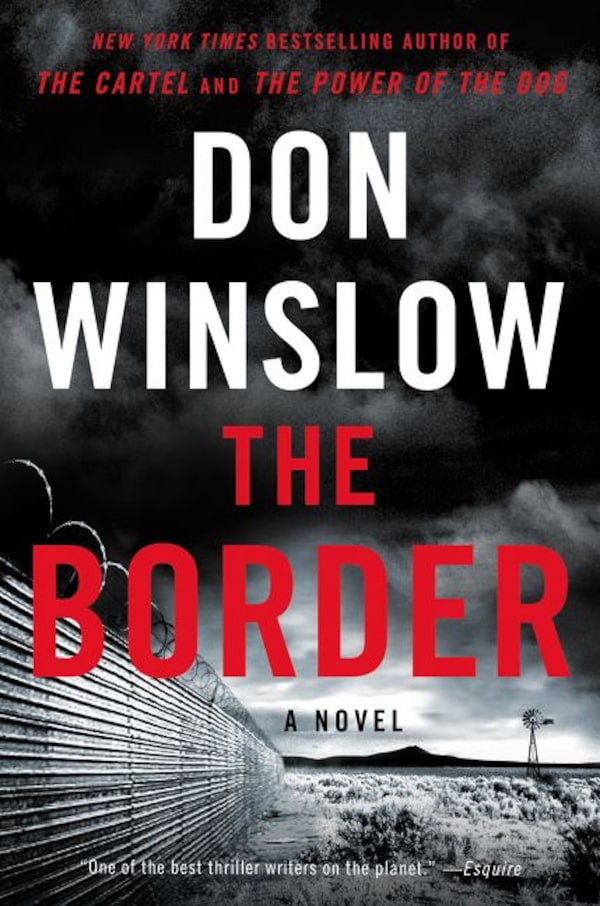
Handout
- Title: The Border
- Author: Don Winslow
- Genre: Fiction
- Publisher: William Morrow
- Pages: 736 pages
- Price: $32.98
It is far easier to read Don Winslow’s The Border than it is to write about it. The massive novel – not just in size at 736 pages, but in scope – is Peak Page-Turner. Thanks to Winslow’s affinity for hard-boiled staccato sentences, blunt but powerful turns of phrase and an insatiable need to push through narrative as if setting a world land-speed record, all the reader can do is attempt to grip his prose and pray they don’t let go. Like Winslow’s other work, including 2005′s The Power of the Dog and 2015′s The Cartel, the two novels that act as prequels to The Border, you will begin this epic on the United States’ war on drugs with the best and most time-managed of expectations. And then it will suddenly be 3 a.m. and your entire week will be utterly wrecked.
But reviewing Winslow’s work, that is a less breezy task. Mostly, you want to ambush the author and shake his hand vigorously, maybe wrap him in a bear-hug, to congratulate him on creating a propulsive, hyperaggressive work of fury fiction – the type of novel that will rattle your soul in those early-morning hours as you come face to face with all the corruption and depravity in the world: The Mexican drug cartels fighting for territory and respect, slaughtering anyone – man, woman, child – who comes in the way. The corrupt authorities on both sides of the U.S.-Mexico border who allow and encourage the atrocities to continue. The sex traffickers, low-level drug-slingers and everyone else on the periphery who profit off the miserablism. Thank you for revealing the truth, you will say to Winslow, and you will mean it. Like the author’s other work, The Border is based on years of meticulous and depressing research, and its strong, often overpowering stink of verisimilitude will linger for days, weeks, afterward.

Don Winslow.Erik Simander/The Canadian Press
Yet at the same time, there will be a nagging … not quite discomfort, but a tinge of undeniable queasiness. Because Don Winslow not only widens your eyes, he clamps them open, Clockwork Orange-style, as countless horrors are projected from the page. Murder, rape, overdoses, assault and unimaginable betrayal, all detailed in Winslow’s now-signature style: fast, matter-of-fact and relentless. You will survive The Border – unlike most of its characters – but it will make you sick. Doubtless that’s Winslow’s intention, as the novel is one long indictment of not only the Western world’s drug culture, but human nature. With the exception of a noble few, in the end, we’re all hopelessly addicted. To greed, to power, to ignorance.
One of Winslow’s best tricks with The Border is how it acts as both the capper to a trilogy and a standalone work. If you have yet to read The Power of the Dog and The Cartel, that’s fine (though you should read The Cartel, Winslow’s best book). Each novel centres on the Jack Ryan-esque hero Art Keller, a Drug Enforcement Administration operative who plays by his own rules and is constantly shown to be smarter, quicker and ultimately more ethical and moral than anyone else in the U.S. or Mexican government. By the time The Border begins, Keller has dispatched long-time cartel-boss nemesis Adan Barrera (although Winslow plays coy on this fact for a quick stretch) and is now heading the DEA. But any time a character or event resurfaces from one of the previous novels, Winslow is quick to provide a concise rundown of all the relevant back story. It’s a smooth twist on the flashback, even if it tips over into self-parody at The Border’s very end, when Keller delivers a chapter-long speech running down the entire saga’s highs and lows.

The Border is based on years of meticulous research.istock
If The Border were to centre entirely on the righteous and self-destructive Keller, it might inch into slog territory. Fortunately, Winslow again conducts a master class in world-building, populating his novel with all manner of heroes, villains and his specialty: those who fall in between. Sometimes these characters and their subplots feel too familiar, such as the New York cop who goes undercover to bust a heroin ring and the old-time captain who remains his sole contact, which echoes Martin Scorsese’s The Departed so heavily that I couldn’t help but fantasy-cast Leonardo DiCaprio and Martin Sheen into the roles. Other times, the characters render themselves with such a ferocious realism that the work approaches docudrama levels of heartache, such as the young Guatemalan boy Nico, who trades his gang-infested homeland for another, quieter horror story in the United States. And infrequently, Winslow wallows in the worst of clichés, especially whenever he writes for black characters. Mostly, Winslow keeps you busy, and when the narrative threads are inevitably stitched together, the result is more devastating than anything else.
Less successful are Winslow’s attempts at giving Keller’s world a here-and-now 2019 feel. While previous U.S. government administrations were hinted at in The Power of the Dog and The Cartel, The Border ends up leaning heavily on a Donald Trump facsimile named Dennison, along with a Jared Kushner stand-in. It’s a well-intentioned but ultimately misguided, even silly, plot twist. Here, Winslow torques the Trump narrative to have the POTUS not in the pocket of Putin, but Mexican drug lords. As the novel culminates in Keller’s fearless attempts to expose the corruption and hypocrisy of Washington – the book could have just as easily, but thankfully not, been titled The Wall – Winslow tips his hat an inch too far into Saturday Night Live territory. The story of the U.S. war on drugs is a devastating one on its own, no Trump surrogate necessary.
Some readers have already called The Border the crime-fiction equivalent of The Stand – the kind of compulsive Stephen King-esque epic that captivates and horrifies. That feels apt. But The Stand had the actual Devil as its villain. The Border doesn’t need to be as literal-minded (and yes, it’s clear Winslow thinks Trump is more or less Satan). If there is one ultimate truth that Winslow’s novel reveals, it is that evil is no one person, but all around us.
Expand your mind and build your reading list with the Books newsletter. Sign up today.
 Barry Hertz
Barry Hertz